Trump Faces Youth Climate Lawsuit
Air Date: Week of July 4, 2025
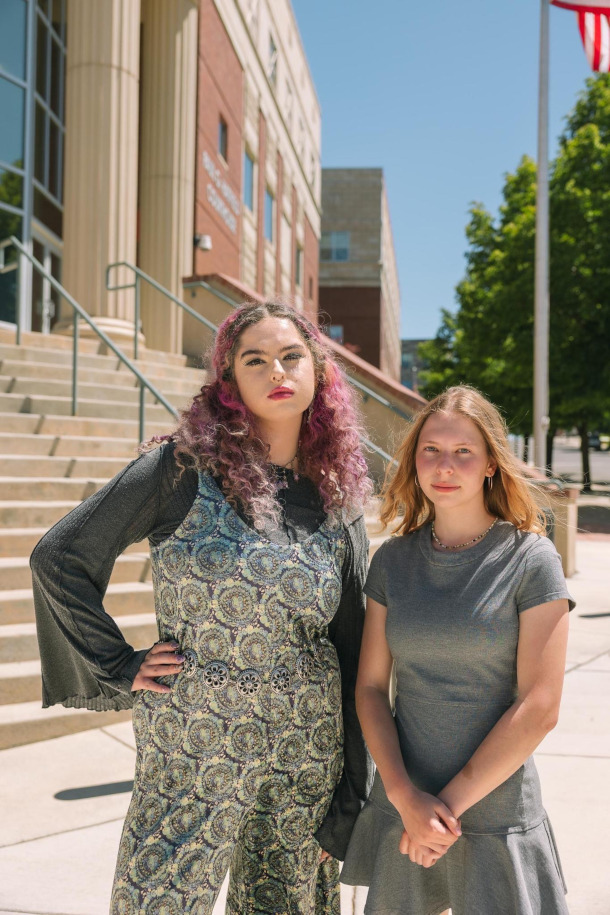
Eva Lighthiser (right) alongside another co-plaintiff in the case, Olivia Vesovich (left). (Photo: Courtesy of Our Children's Trust)
19-year-old Eva Lighthiser has experienced climate anxiety for most of her life, as her home state of Montana faces worsening floods, wildfires, and extreme heat. Now she and 20 other young people are suing the Trump administration over its efforts to boost fossil fuels while suppressing climate science and renewable energy. Eva Lighthiser, the lead plaintiff in Lighthiser v. Trump, joins Host Jenni Doering to share why she is pushing back against policies she believes are harming her future.
Transcript
O’NEILL: From PRX and the Jennifer and Ted Stanley Studios at the University of Massachusetts, Boston, this is Living on Earth. I’m Aynsley O’Neill.
DOERING: And I’m Jenni Doering.
As climate policies are being rolled back by the Trump Administration and the U.S. Congress, young people are once again seeking the help of the third branch of our federal government in securing a safe, livable future. Almost ten years ago, the first major youth climate case, Juliana versus United States, was filed by the nonprofit Our Children’s Trust on behalf of 21 young people. It kicked off a protracted battle over whether the plaintiffs had standing that ended just this spring when the U.S. Supreme Court declined to let the case go to trial. But as we’ve reported in recent months, other sets of youth plaintiffs represented by Our Children’s Trust attorneys have won significant victories in state courts. And the new federal youth climate case, Lighthiser v. Trump, takes a different approach than Juliana. The executive order blitz from President Trump, and subsequent agency directives at EPA, the Departments of Interior, Energy, Commerce and more, have given this case much clearer targets. The plaintiffs say these executive orders and the resulting agency actions are actively harming them. Nineteen-year-old Eva Lighthiser is the lead plaintiff in Lighthiser v. Trump, and she joins us now from Livingston, Montana. Eva, welcome to Living on Earth!
LIGHTHISER: Thanks for having me.
DOERING: So tell us a little bit about yourself. What's your history with climate activism?
LIGHTHISER: I have been involved in climate litigation now for the past five years. I originally became a plaintiff on the lawsuit Held v. Montana, which went to trial and then subsequently was appealed to the Montana Supreme Court and won, and I have a deep history in Montana, having lived in Livingston most of my life and enjoying everything my surroundings have to offer.
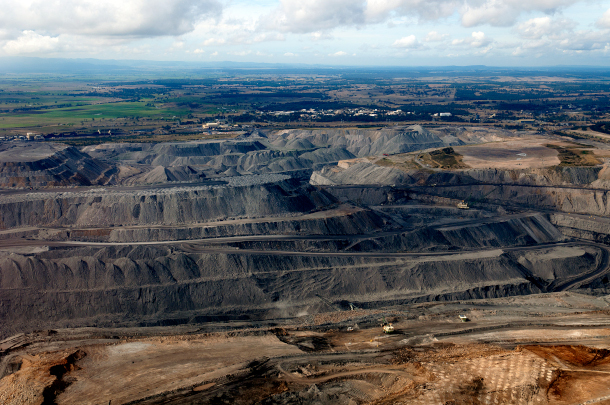
Part of the youth plaintiff’s case against President Trump regards his administration’s support of coal as an energy source. When coal is burned for energy, it releases high levels of carbon emissions and deadly air pollutants. (Photo: Max Phillips, Wikimedia Commons, CC BY 2.0)
DOERING: Eva, how have you personally felt the effects of environmental degradation and the climate crisis?
LIGHTHISER: I have experienced a plethora of, you know, different flooding events, wildfire smoke, each summer it's' kind of a new animal. Having every summer be smoke filled and, you know, experiencing just all the side effects of having your lungs be filled with smoke all day. You know, you've got a sore throat, a runny nose, congestion, and sometimes it's not super safe to exert yourself outdoors. Also, just seeing impacts on my community is really hard for me to see. During the flood on the Yellowstone River in 2022 we had a friend who lost both her home and business to the flood, and that is so detrimental. It's incredibly frightening to think that something like that could happen much more frequently and at a much larger scale. When I was 12, I lived outside of town a ways, and I had to cross a bridge in order to get into the city and that bridge was condemned and destroyed, and they put a temporary bridge in place while a new one was, you know, supposed to be built, but that bridge was washed away in a flooding event, and we had to drive all the ways into the neighboring county in order to get back into town, and that was a factor in us moving away from that house, just because of the uncertainty that came with flooding events.
DOERING: You mentioned being involved in the Held v. Montana case, which won this kind of landmark victory which found that, indeed, there is a right to a healthful environment in the Montana constitution and that includes preventing climate impacts. How does that contrast with what you're seeing out of the federal government at this moment?
LIGHTHISER: I think it contrasts a lot. You know, having won in that court was an incredible victory, but seeing what's happening at the federal level is extremely distressing. We're challenging three executive orders of which promote the further unleashing of fossil fuels, suppress climate science and suppress renewable energy and that is exactly the opposite direction that we need to be going.
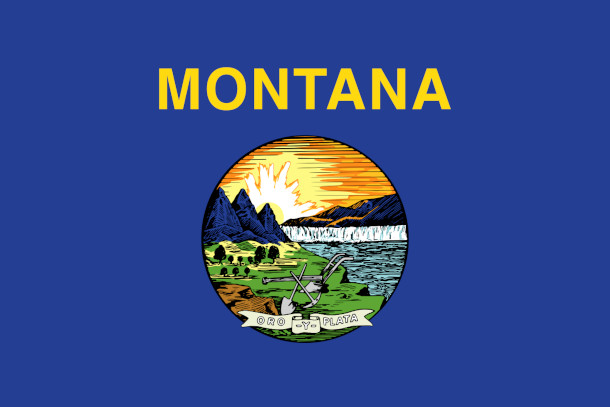
The Montana State Constitution says that citizens have the right to a clean environment. In the landmark case, Held v. Montana, the Montana Supreme Court ruled that this meant that the state government could not ignore environmental factors when permitting fossil fuel operations. (Photo: Enzwell, Wikimedia Commons, CC BY-SA 4.0)
DOERING: So Eva, you're suing the President of the United States as well as members of his cabinet. What does it feel like to be challenging such powerful entities and you know, as somebody who's only just entered adulthood?
LIGHTHISER: It's both intimidating but also incredibly invigorating. As young people whose voices are kind of underrepresented, you know, in the federal government, I think it feels incredibly powerful to be able to do this, to be able to speak up and use our voices.
DOERING: And tell me more about the executive orders and agency actions that this complaint, this lawsuit, is targeting. Which ones are you focusing on here?
LIGHTHISER: So we're focusing on an executive order that's, it's called, you know, Unleashing Fossil Fuels, that's kind of an abbreviated name for it, there's one that's, it's like Declaring a National Emergency, and then there's one that's Reinvigorating America's Beautiful Energy System. And all of these, you know, the different government agencies that are carrying out these executive orders are also in violation of the Constitution, because we are claiming that these executive orders are unconstitutional under the Fifth Amendment, which entails us the right to life and liberty because they are actively harming us as young people in the US.
DOERING: One of the things that President Trump has been focusing on in his second administration is trying to bring back coal fired power, and I understand that this is affecting Montana. What's going on there?
LIGHTHISER: You know, as somebody who lives in a railroad town, I see dozens of trains go through each day and a lot of them are carrying coal and transporting it from the Spring Creek Mine in Montana to coal strip, which is one of the most polluting plants in the country. And that's worrying in so many ways. But, you know, living here in a railroad town, it's concerning to see that coal dust, you know, blowing over town whenever the trains come through and understanding that there's going to be environmental and health implications because of that. And it's entirely within our power to start converting to renewable energy systems and it's very, very reductive to expand the mining of coal and the burning of it.
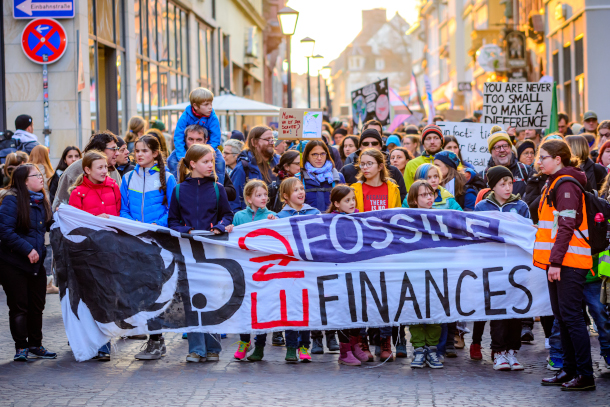
Lighthiser and her co-plaintiffs are illustrative of an international youth movement to protect their futures from the climate crisis. (Photo: Stephan Sprinz, Wikimedia Commons, CC BY 4.0)
DOERING: From your perspective, how important is access to a healthy environment to live in?
LIGHTHISER: I think it's absolutely crucial. We are, you know, US citizens, and here in Montana, in our Constitution, it states that we have the inalienable right to a clean and healthful environment. So I believe it is absolutely crucial that we continue to have a healthy environment going forward as well. You know, as a young person, I'm incredibly uncertain about my future and about our collective futures. Right now, it's a very scary time.
DOERING: Speaking of uncertainty and anxiety, we hear a lot about climate anxiety, especially among young people these days. How has that affected you personally?
LIGHTHISER: I've always kind of experienced climate anxiety. I think, ever since I was pretty young, I've been aware of climate change. And you know, as I've gotten older and continued to see more and more of it around me, it has been incredibly depressing, and it makes me really, really anxious to think about my future. And it is, it's something that's on my mind all the time.
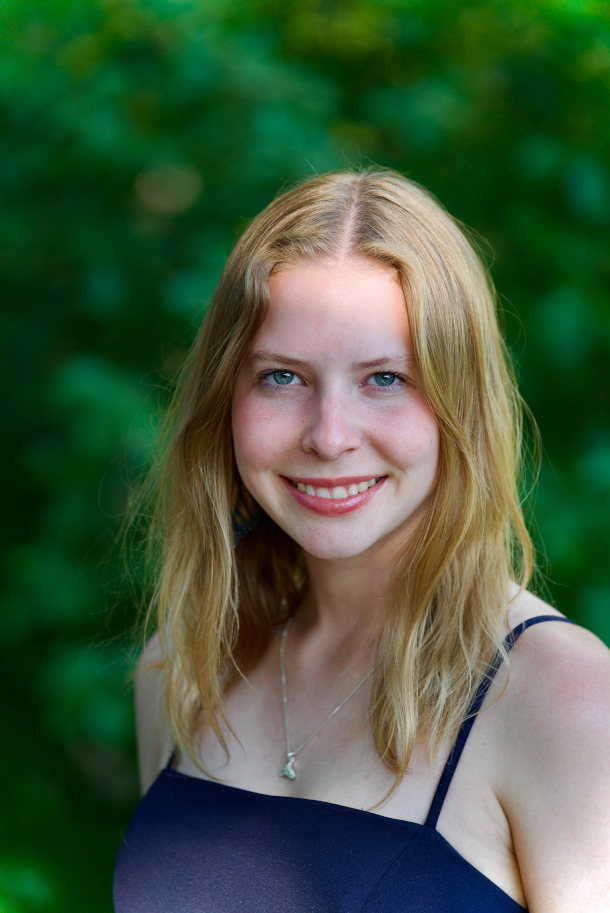
Eva Lighthiser is a key plaintiff in the case Lighthiser v. Trump, which alleges that President Trump violates the constitution by increasing the use of fossil fuels and thereby endangering the life and liberty of young people who will face the increasing impacts of the climate crisis. (Photo: Courtesy of Eva Lighthiser)
DOERING: What kind of response have you received so far from members of your community once they've heard about this new lawsuit?
LIGHTHISER: You know, so far, I've been very fortunate to hear nothing but really supportive messages from people. I think a lot of people are really excited about this. When they hear that young people are taking on the government, I think it really is inspiring to everybody. So far, I have been really lucky, and I've heard mostly only positives, of course, you know, ignoring comment sections on social media, and the usual thing, it's something that I've been doing for a while anyways, so I just tend to kind of avoid that for my own sake.
DOERING: I know it's been, actually several years already since you started being involved in the Held v. Montana case, this case Lighthizer v. Trump could potentially last years and years. What have you learned since starting this all those years ago, and what do you hope for in the years ahead?
LIGHTHISER: I think something that I've learned is that litigation takes time, but you know, I'm prepared to be a part of it moving forward, and I'm aware that it does take time, and I'm concerned about the state of our current administration, and I will be for the next four years. By implementing these executive orders, our president is harming us but we are doing something about it. We are using our voices, and we are speaking up, and we are going to challenge that, and we aren't going to quit. I'm confident that, you know, if we stay in this fight, progress will happen.
DOERING: Eva, Lighthizer is one of the youth plaintiffs in Lighthizer v. Trump. Thank you so much, Eva.
LIGHTHISER: Thank you so much for having me.
Links
Listen to our story about Held v. Montana, the landmark state court case that preceded this one.
Read an article from our media partner, Inside Climate News, about Lighthiser v. Trump
Living on Earth wants to hear from you!
Living on Earth
62 Calef Highway, Suite 212
Lee, NH 03861
Telephone: 617-287-4121
E-mail: comments@loe.org
Newsletter [Click here]
Donate to Living on Earth!
Living on Earth is an independent media program and relies entirely on contributions from listeners and institutions supporting public service. Please donate now to preserve an independent environmental voice.
NewsletterLiving on Earth offers a weekly delivery of the show's rundown to your mailbox. Sign up for our newsletter today!
 Sailors For The Sea: Be the change you want to sea.
Sailors For The Sea: Be the change you want to sea.
 The Grantham Foundation for the Protection of the Environment: Committed to protecting and improving the health of the global environment.
The Grantham Foundation for the Protection of the Environment: Committed to protecting and improving the health of the global environment.
 Contribute to Living on Earth and receive, as our gift to you, an archival print of one of Mark Seth Lender's extraordinary wildlife photographs. Follow the link to see Mark's current collection of photographs.
Contribute to Living on Earth and receive, as our gift to you, an archival print of one of Mark Seth Lender's extraordinary wildlife photographs. Follow the link to see Mark's current collection of photographs.
 Buy a signed copy of Mark Seth Lender's book Smeagull the Seagull & support Living on Earth
Buy a signed copy of Mark Seth Lender's book Smeagull the Seagull & support Living on Earth

